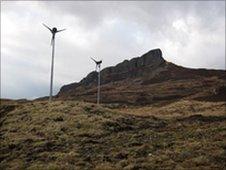Eigg wins green award amid forced return to diesel
- Published

Eigg usually gets its power from wind, hydro and solar power
Islanders have been rewarded for their "green" power projects just days after a shortage of rain has meant them having to revert back to fossil fuel.
The Isle of Eigg Heritage Trust has been named overall UK winner in the Ashden Awards for Sustainable Energy.
Residents of Eigg usually get most of their electricity from hydro, solar and wind schemes.
But they have been using diesel generators until hydro-electric generation can be resumed.
Winning gold at the 10th annual Ashden Awards has secured £20,000 for the heritage trust to invest in future energy projects.
The prize recognises the islanders' success in reducing household carbon emissions by 47%.
Renewable energy normally provides the isle with 92% of its electricity.
Transport plans
As well as micro hydro-electric schemes, Eigg also has wind turbines and photo-voltaic cells which harness the power of the sun.
However, a lack of sufficient rainfall has affected the hydro projects and diesel generators have been charging batteries that provide households with electricity.
The award judges described Eigg's renewable power efforts as "refreshing" and they had set an example for other communities.
Judges were impressed by how electricity demand is capped to reduce carbon emissions.
If users go over the limit they are automatically cut off, requiring an engineer's visit to reconnect them.
Every household and business has an energy monitor with an alarm built in, which goes off when they are close to the cap.
Fewer than 10 households out of about 45 homes, 20 businesses and six community buildings on the island have been cut off in the first two years of operation.
The heritage trust also makes grants available for energy efficient light bulbs, insulation, thicker curtains and other energy saving measures.
It has plans for a community transport scheme and new energy supplies are being developed, including sustainable harvesting of the trees to supply wood for heating.